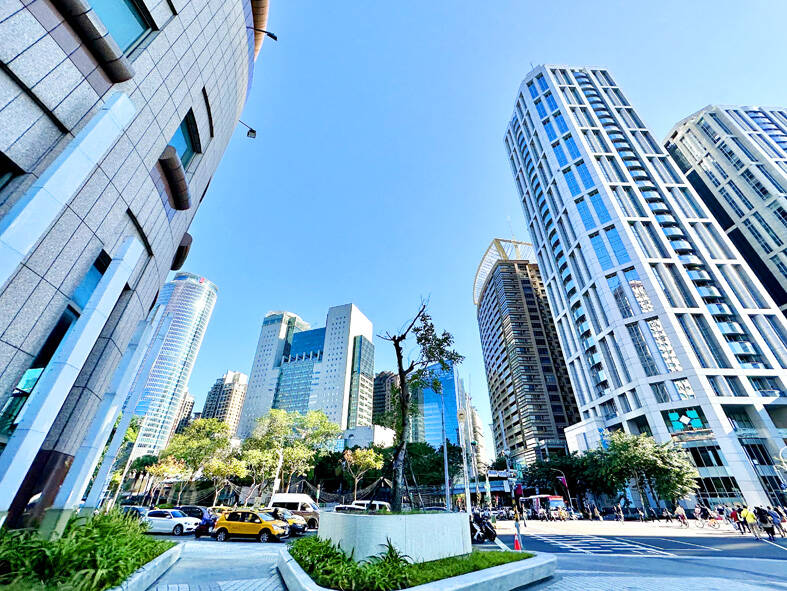Housing transactions in the six special municipalities last month totaled 23,801 units, representing a 16.9 percent increase from a year earlier, as favorable lending terms and stock market rallies bolstered buying interest, data released by separate local administrations showed on Monday.
Real demand for first homes continued to facilitate transactions after the government in August last year introduced an interest rate subsidy to help people buy their own home, Sinyi Realty Inc (信義房屋) research manager Tseng Ching-der (曾敬德) said in a note.
Buying interest remained strong even though the central bank last month tightened the loan-to-value limit from 70 percent to 60 percent for second-home purchases in Taipei, New Taipei City, Taoyuan, Taichung, Tainan and Kaohsiung, as well as Hsinchu city and county, Tseng said.

Photo: Hsu Yi-ping, Taipei Times
The measure, which reflected the central bank’s concern over the increases in housing loans and prices, does not affect first-home purchases, which still qualify for low interest rates of 1.775 percent, a five-year grace period and mortgages of up to 40 years until the stimulus program expires in 2026, Tseng said.
That helped explain why the market remained stable last month, while the number of homes available for sale declined, he said, expecting the uptrend to continue into the second half as long as the local bourse remained strong.
The stock market rallies inflate wealth for investors and expedite home purchase decisions, Tseng added.
Tainan reported the biggest increase of 44 percent in transactions from a year earlier to 2,399 units, followed by a 37.8 percent advance in Taoyuan to 4,641 units, and Kaohsiung’s 30.5 percent rise to 4,048 units, the data showed.
Taichung posted a 5.5 percent pickup to 2,619 units, while Taipei and New Taipei City posted moderate increases of 5.4 percent and 1.9 percent to 2,619 units and 5,369 units respectively.
Last month’s total transactions represented an 11.5 percent decrease when compared with one month earlier, due mainly to a lack of new home deliveries, rather than a turnaround in sentiment, Evertrust Rehouse Co (永慶房屋) deputy research head Chen Chin-ping (陳金萍) said.
Taiwan’s robust economic data helped underpin the TAIEX rallies and housing transactions, Chen said, adding that the uptrend is expected to continue.
However, Great Home Realty Co (大家房屋) expressed doubt that the momentum could be sustained, as the government has moved to tighten reviews of first-home loan applications to root out dummy buyers and loan abuses.
Property investors use the favorable lending terms to buy houses through dummy accounts to generate rent income, in violation of the self-occupancy requirement.
The government might adopt more restrictions if the property fever grows unchecked, Great Home said.
Overall, housing deals in the six special municipalities totaled 136,499 units in the first half of this year, up 27.6 percent from the a year earlier, the data showed.

TAKING STOCK: A Taiwanese cookware firm in Vietnam urged customers to assess inventory or place orders early so shipments can reach the US while tariffs are paused Taiwanese businesses in Vietnam are exploring alternatives after the White House imposed a 46 percent import duty on Vietnamese goods, following US President Donald Trump’s announcement of “reciprocal” tariffs on the US’ trading partners. Lo Shih-liang (羅世良), chairman of Brico Industry Co (裕茂工業), a Taiwanese company that manufactures cast iron cookware and stove components in Vietnam, said that more than 40 percent of his business was tied to the US market, describing the constant US policy shifts as an emotional roller coaster. “I work during the day and stay up all night watching the news. I’ve been following US news until 3am

UNCERTAINTY: Innolux activated a stringent supply chain management mechanism, as it did during the COVID-19 pandemic, to ensure optimal inventory levels for customers Flat-panel display makers AUO Corp (友達) and Innolux Corp (群創) yesterday said that about 12 to 20 percent of their display business is at risk of potential US tariffs and that they would relocate production or shipment destinations to mitigate the levies’ effects. US tariffs would have a direct impact of US$200 million on AUO’s revenue, company chairman Paul Peng (彭雙浪) told reporters on the sidelines of the Touch Taiwan trade show in Taipei yesterday. That would make up about 12 percent of the company’s overall revenue. To cope with the tariff uncertainty, AUO plans to allocate its production to manufacturing facilities in

Six years ago, LVMH’s billionaire CEO Bernard Arnault and US President Donald Trump cut the blue ribbon on a factory in rural Texas that would make designer handbags for Louis Vuitton, one of the world’s best-known luxury brands. However, since the high-profile opening, the factory has faced a host of problems limiting production, 11 former Louis Vuitton employees said. The site has consistently ranked among the worst-performing for Louis Vuitton globally, “significantly” underperforming other facilities, said three former Louis Vuitton workers and a senior industry source, who cited internal rankings shared with staff. The plant’s problems — which have not

TARIFF CONCERNS: The chipmaker cited global uncertainty from US tariffs and a weakening economic outlook, but said its Singapore expansion remains on track Vanguard International Semiconductor Corp (世界先進), a foundry service provider specializing in producing power management and display driver chips, yesterday withdrew its full-year revenue projection of moderate growth for this year, as escalating US tariff tensions raised uncertainty and concern about a potential economic recession. The Hsinchu-based chipmaker in February said revenues this year would grow mildly from last year based on improving supply chain inventory levels and market demand. At the time, it also anticipated gradual quarter revenue growth. However, the US’ sweeping tariff policy has upended the industry’s supply chains and weakened economic prospects for the world economy, it said. “Now